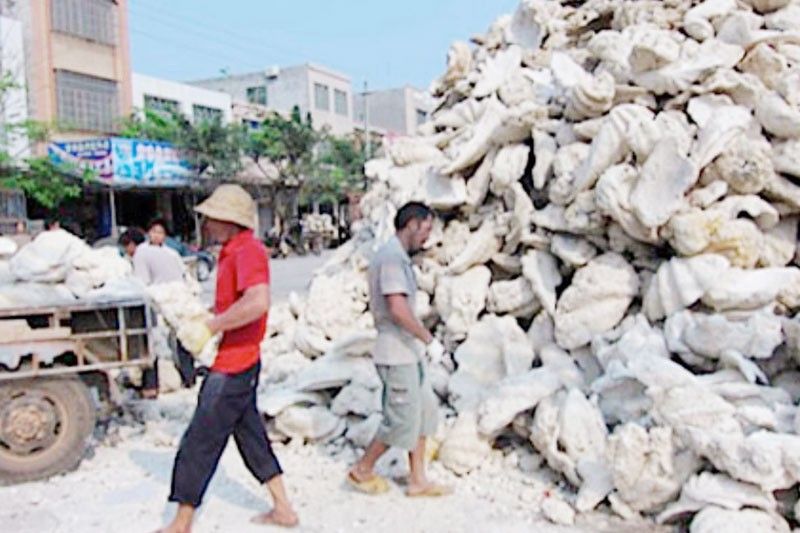Chinese ecocide


Ecocide, or ecocatastrophe, is the extensive damage to, destruction of or loss of ecosystem(s) of a given territory, whether by human agency or by other, to such an extent that peaceful enjoyment by the inhabitants of that territory has been or will be severely diminished.
“Satellite Imagery Shows Ecocide in the South China Sea…… show man-made scarring of coral reefs on a scale heretofore unappreciated, much of which occurred between 2012 and late 2015. The scarring, resulting from widespread chopping of reefs by fishermen using propellers mounted on small boats in order to poach giant clam shells, is visible on recent images of at least 28 reefs in the Spratly and Paracel island groups, in territories disputed by Vietnam, the Philippines, China, Malaysia, Taiwan and Brunei. Evidence from news reports, aerial photos, videos and commercial websites directly link much, and probably most, of the “prop chop” reef destruction to fishermen from China, particularly from the port of Tanmen on Hainan Island.” (by Victor Robert Lee of DIPLOMAT on Jan. 15,2016)
The environmental issue that former foreign affairs secretary Alberto del Rosario and former ombudsman Conchita Carpio-Morales are raising in the case against China at the ICC were already ruled upon by the Permanent Court of Arbitration (PCA) which found China to be in violation of its obligation under Articles 192 and 194 of UNCLOS. The PCA “considered the effect on the marine environment of China’s recent large-scale land reclamation and construction of artificial islands and found that China had caused severe harm to the coral reef environment and violated its obligation to preserve and protect fragile ecosystems and the habitat of depleted, threatened, or endangered species.”
The PCA also found that “Chinese authorities were aware that Chinese fishermen have harvested endangered sea turtles, coral, and giant clams on a substantial scale in the South China Sea (using methods that inflict severe damage on the coral reef environment) and had not fulfilled their obligations to stop such activities.” Indeed, all claimant-countries have encouraged their people to fish with the goal of strengthening the territorial claims. But Philippine fishing activities have mostly been small scale and artisanal, while China deploys large scale and commercial fleets that apply destructive methods particularly in harvesting giant clams. It should be recalled that the Scarborough Shoal standoff started when Philippine law enforcement discovered Chinese fishing vessels with illegally collected corals, giant clams, sea turtles and live sharks – all protected species. These rulings were made. In 2016 as part of the arbitration case brought by the Philippines at the PCA in 2015 which China has refused to recognize.
John McManus, from the University of Miami, has highlighted the impact of island reclamation in the SCS/WPS to the corals to a point beyond which they will be unable to recover. McManus research concluded that 40 square miles (104 square km) of some of the most biodiverse coral reefs on Earth have been destroyed in the SCS/WPS thanks to Chinese giant-clam poachers. Combined with China’s building artificial islands around disputed rocks and reefs, it has paved over another 22 square miles of coral. When the two activities are taken together, McManus says, about 10 percent of the reefs in the vast Spratly archipelago to the south of Hainan, and 8 percent of those in the Paracel islands, between Hainan and Vietnam, have been destroyed.
This is a looming environmental disaster that will affect future generations, more particularly the countries that border these waters which are the breeding ground for much of the fish stocks caught in the region. In this sense this should be considered just as disturbing as Chinese military activities. We should look at this not from a geopolitical perspective, but from an environmental lens. My hope is that this galvanizes the environmental community, which has so far remained quiet, and lead to a clamor to address these concerns. China should accept responsibility and not shirk from doing so by casting this as being politically motivated.
Albert del Rosario’s persistence in keeping Chinese actuations in the SCS/WPS front and center despite being labeled as “quixotic” is worthy of praise and admiration. More than just applaud him, let us show that he is not alone and that we care as well.
- Latest
- Trending






























